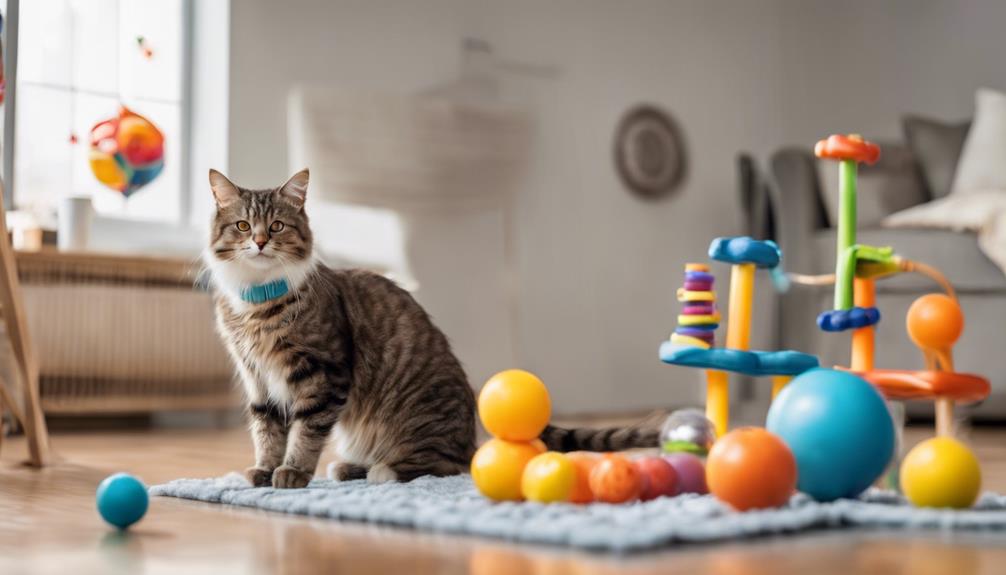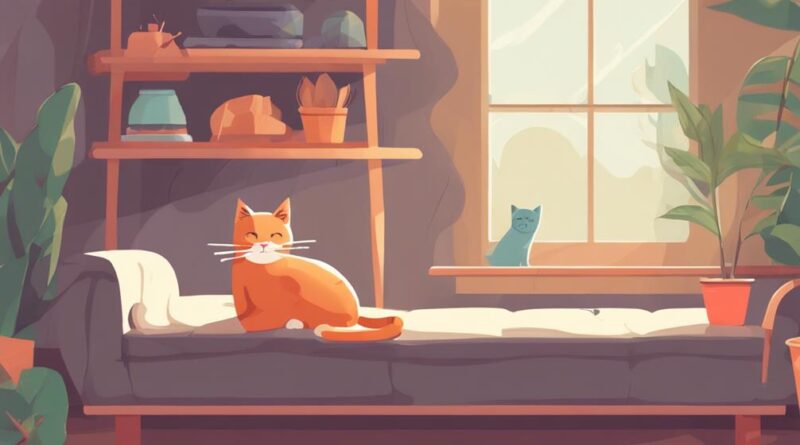3 Best Factors Influencing Indoor Cat Lifespan
When it comes to ensuring your indoor cat's longevity, it's crucial to remember that not all nine lives are created equal. Understanding the three key factors that can significantly impact your feline companion's lifespan is essential for providing them with the best care possible.
From the quality of their diet to the enrichment of their environment, each element plays a vital role in promoting a healthier and longer life for your beloved cat. But what exactly are these factors, and how can they make a difference in your furry friend's well-being?
Diet and Nutrition
To extend your indoor cat's lifespan, providing a balanced diet rich in essential nutrients is crucial. When it comes to food quality, opt for high-quality cat food that meets your feline friend's nutritional needs. Look for brands that have real meat listed as the first ingredient and avoid artificial additives or fillers. Ensuring your cat's diet is made up of quality ingredients can have a significant impact on their overall health and longevity.
Equally important is establishing a consistent feeding schedule for your indoor cat. Cats thrive on routine, so feeding them at the same times each day can help regulate their metabolism and prevent obesity-related issues. Divide their daily portion into multiple small meals to mimic their natural hunting behavior and keep them satisfied throughout the day. Remember to provide fresh water at all times to keep your cat well-hydrated.
Environmental Enrichment
Enhancing your indoor cat's environment with stimulating activities can significantly improve their overall well-being and quality of life. Providing enriching activities and behavioral stimulation is essential for keeping your feline friend happy and healthy.
Introducing interactive toys like puzzle feeders or laser pointers can engage your cat's natural hunting instincts, providing mental and physical stimulation. Creating vertical spaces with cat trees or shelves allows your cat to climb, perch, and observe their surroundings, mimicking their outdoor experiences.
Incorporating scratching posts and toys that encourage playtime can prevent boredom and destructive behavior. Rotating toys regularly can keep your cat interested and mentally sharp. Additionally, hiding treats around the house or using food-dispensing toys can promote foraging behavior, keeping your cat mentally stimulated.
Offering a variety of textures and surfaces for your cat to explore, such as cardboard boxes, soft blankets, or grass mats, can enhance their sensory experience. Providing safe outdoor exposure through enclosed catio spaces or window perches can also enrich your cat's environment by allowing them to observe birds, squirrels, and other outdoor stimuli.
Regular Veterinary Care
Regular veterinary check-ups are crucial for ensuring your indoor cat's health and longevity. By scheduling annual check-ups with your veterinarian, you can take preventive measures to detect any potential health issues early on and provide appropriate care to prolong your cat's lifespan. These regular visits allow the vet to monitor your cat's weight, dental health, and overall well-being, addressing any concerns promptly.
During these annual check-ups, your veterinarian can administer necessary vaccinations to protect your indoor cat from common diseases. They can also conduct routine screenings for conditions such as kidney disease, diabetes, and dental problems that can significantly impact your cat's quality of life if left untreated. By staying up to date with these preventive measures, you can help your cat live a healthier and longer life.
In addition to physical examinations, annual vet visits provide an opportunity for you to discuss your cat's diet, exercise routine, and any behavior changes you may have noticed. Your vet can offer tailored advice to ensure your indoor cat is receiving the proper nutrition and mental stimulation needed for optimal well-being. By prioritizing regular veterinary care and annual check-ups, you're actively contributing to your cat's overall health and longevity.
Exercise and Playtime
Engaging your indoor cat in regular physical activity and play sessions is essential for maintaining their overall health and well-being. Keeping your feline friend active helps prevent obesity, promotes mental stimulation, and strengthens the bond between you and your pet.
Here are some tips to ensure your indoor cat gets enough exercise and playtime:
- Interactive Toys: Invest in toys that require your cat to chase, pounce, and swat. Toys like laser pointers, feather wands, and treat puzzles can keep your cat engaged and entertained.
- Climbing Structures: Cats love to climb and perch up high. Providing cat trees, shelves, or window perches allows your cat to satisfy their natural instinct to climb while also giving them a safe space to observe their surroundings.
- Scheduled Play Sessions: Set aside dedicated time each day to play with your cat. Use toys that mimic prey animals to activate their hunting instincts and encourage them to stay active.
- Rotate Toys: Keep your cat's interest piqued by rotating their toys regularly. Introducing new toys or hiding toys for a while before bringing them back out can keep playtime exciting and engaging for your cat.
Stress Management
To ensure your indoor cat's well-being and longevity, managing stress is crucial. Cats, like humans, can experience stress which may impact their mental health and overall lifespan. Implementing relaxation techniques can significantly benefit your feline friend. Providing cozy hiding spots, soothing music, or comfortable bedding can create a calming environment for your cat to unwind. Additionally, engaging in interactive play sessions and gentle petting can help reduce stress levels and promote mental well-being.
Coping mechanisms play a vital role in helping your indoor cat manage stress. Monitoring your cat's behavior for signs of stress, such as excessive grooming or irritability, can aid in early intervention. Behavior modification techniques, such as positive reinforcement training, can assist in redirecting negative behaviors caused by stress. Establishing a consistent routine and ensuring your cat has a safe space to retreat to are simple yet effective ways to promote a stress-free environment.
Hydration Levels
Maintaining optimal hydration levels is essential for ensuring the health and well-being of your indoor cat. Adequate water consumption is crucial for various bodily functions and can significantly impact your cat's overall health.
Here are some hydration tips to help keep your feline friend well-hydrated:
- Fresh Water: Always provide your cat with fresh, clean water to encourage regular drinking.
- Multiple Water Stations: Place water bowls in different areas of your home to make it convenient for your cat to access water throughout the day.
- Water Fountain: Consider using a water fountain designed for cats, as some felines prefer running water.
- Wet Food: Incorporating wet food into your cat's diet can also help increase their water intake.
Weight Management

To help your indoor cat maintain a healthy weight, monitoring their food intake and activity levels is crucial. Establishing healthy habits around feeding and playtime can significantly impact your cat's weight management. Begin by providing balanced meals in appropriate portions. Avoid free-feeding as it can lead to overeating. Instead, establish set meal times and portion control to ensure your cat receives the right amount of food each day. Additionally, consider incorporating interactive toys or activities that encourage movement to keep your cat active and engaged.
Regular exercise is key to maintaining a healthy weight for your indoor cat. Engage your feline friend in play sessions that promote physical activity. This could include interactive toys, climbing structures, or even designated playtime with you. By encouraging regular movement, you help your cat burn calories and stay fit.
Monitoring your cat's weight and body condition is essential. Schedule regular check-ups with your veterinarian to track your cat's weight and adjust their diet or activity levels as needed. Remember, healthy habits such as portion control and encouraging activity are fundamental in supporting your indoor cat's weight management. By incorporating these practices into your cat's routine, you can help them lead a long and healthy life.
Genetic Factors
What role do genetic factors play in determining the lifespan of your indoor cat? Genetics can significantly impact how long your feline companion lives. Understanding the influence of genetic factors on your cat's lifespan is crucial for providing the best possible care. Here are some key points to consider:
- Inherited Diseases: Genetic factors can predispose certain breeds to inheritable diseases that may affect their longevity. Regular veterinary check-ups can help detect these conditions early on.
- Longevity: Some cats may have genetic traits that promote a longer lifespan. These cats are more likely to live well into their senior years with proper care and attention.
- Behavior Problems: Genetic factors can also influence your cat's behavior, which may indirectly affect their lifespan. Aggressive behavior or stress-related issues can impact their overall health and quality of life.
- Aging Process: Genetic makeup plays a role in how your cat ages. Some cats may show signs of aging earlier due to genetic factors, while others may maintain their youthful vigor for longer periods.
Frequently Asked Questions
What Are Some Common Household Items That Can Pose a Danger to Indoor Cats?
Household dangers for indoor cats can include various common items like toxic plants. It's important to be aware of potential hazards such as lilies, philodendrons, and poinsettias that can be harmful if ingested. Keep these out of reach or consider pet-friendly alternatives.
Regularly check your home for items like small toys, string, or chemicals that could be dangerous to your curious feline friend. Preventing access to these hazards can help keep your indoor cat safe and healthy.
How Can Indoor Cats Socialize With Other Animals or People to Improve Their Overall Wellbeing?
To improve your indoor cat's wellbeing, there are several strategies you can implement:
Try interactive toys for mental stimulation. Encourage socialization through animal companions or slowly introducing them to new people. Enrichment activities like puzzle feeders can keep your cat engaged and happy.
Gradually expose them to different environments and provide safe spaces to retreat if needed. Building positive associations with social interactions can help your cat thrive both mentally and emotionally.
Are There Any Specific Plants That Should Be Avoided in a Household With Indoor Cats?
When it comes to indoor cats, it's crucial to be aware of toxic plants that can harm your furry friend. Some common indoor plants like lilies, aloe vera, and philodendron can be dangerous.
Opt for safe alternatives such as spider plants, catnip, or cat grass to keep your cat healthy and happy. Remember, a little precaution with your indoor plants can go a long way in ensuring your cat's safety and well-being.
How Can Indoor Cats Maintain Good Dental Health?
To help your indoor cat maintain good dental health, consider giving them dental treats and toys.
Additionally, make sure to schedule regular checkups with the vet for professional cleanings and advice.
Brushing your cat's teeth regularly can also help prevent dental issues.
What Are Some Signs That an Indoor Cat May Be Experiencing Boredom or Lack of Mental Stimulation?
If your indoor cat seems bored or lacks mental stimulation, watch for signs like excessive grooming, overeating, or sleeping more than usual.
To combat this, provide enrichment activities such as interactive play sessions and puzzle feeders.
Engage them with various cat toys, climbing structures, or window perches.
Keep your feline friend entertained and mentally stimulated to ensure their well-being and happiness.
Conclusion
In conclusion, by focusing on factors such as diet, environmental enrichment, regular vet care, exercise, stress management, hydration, weight, and genetics, you can help increase your indoor cat's lifespan.
Providing a balanced diet, engaging in playtime, and ensuring they have a stress-free environment can all contribute to a healthier and longer life for your feline friend.
Remember, taking care of these key factors can make a big difference in your cat's overall well-being and longevity.
